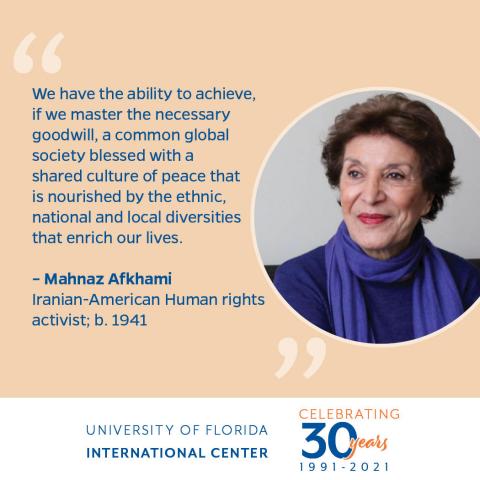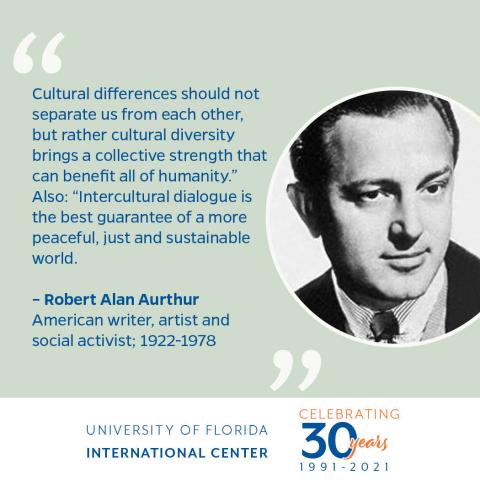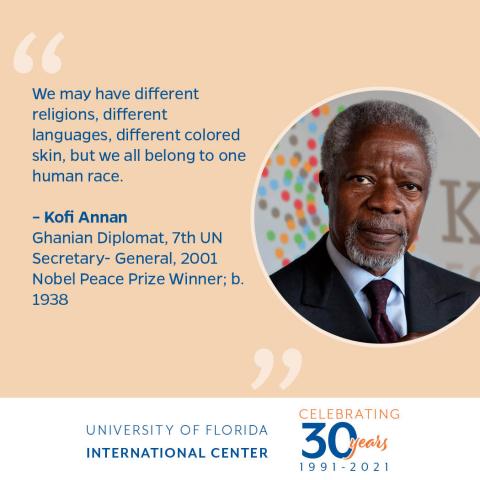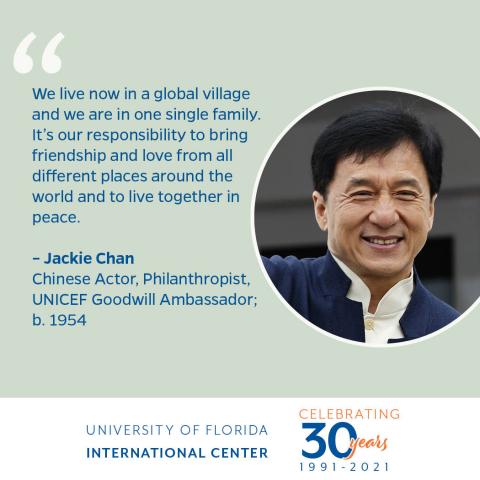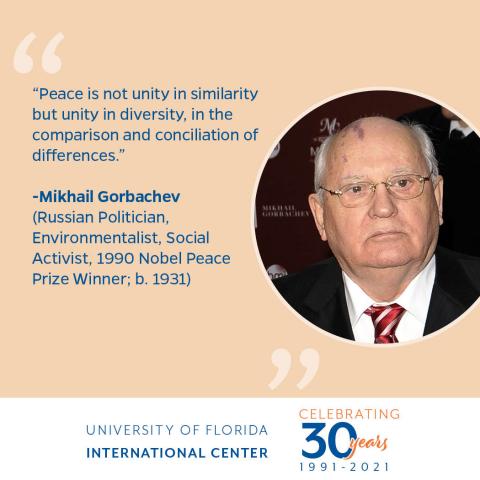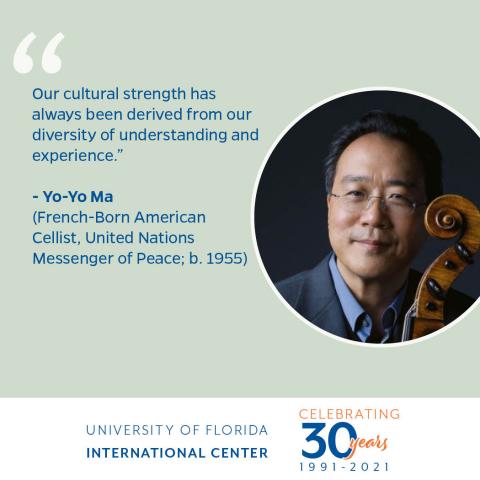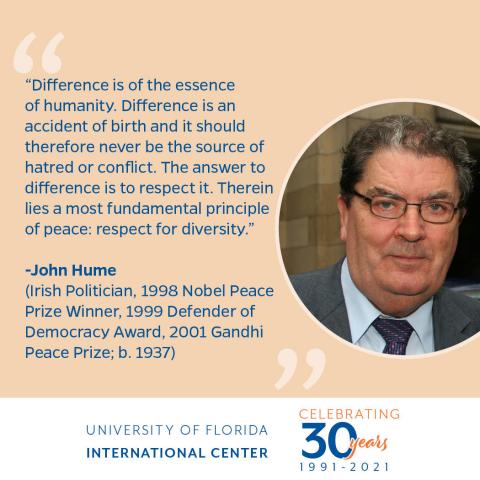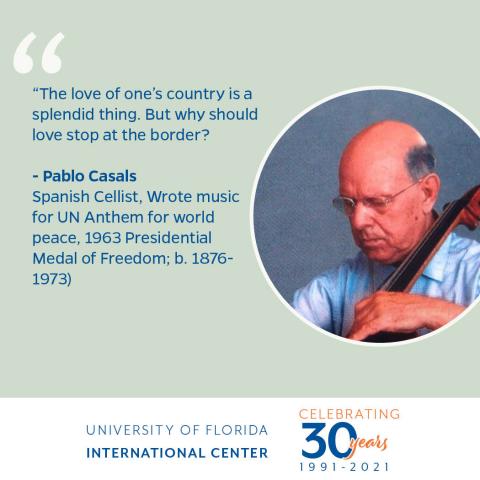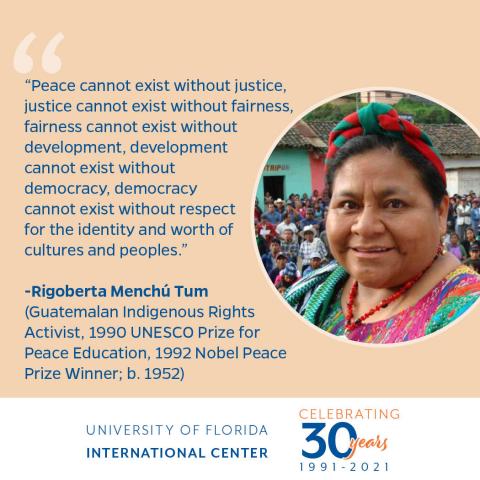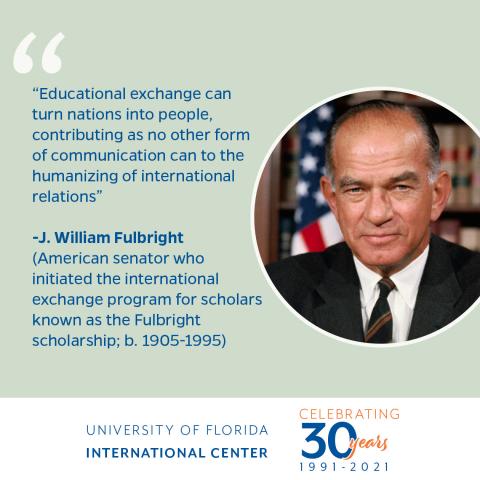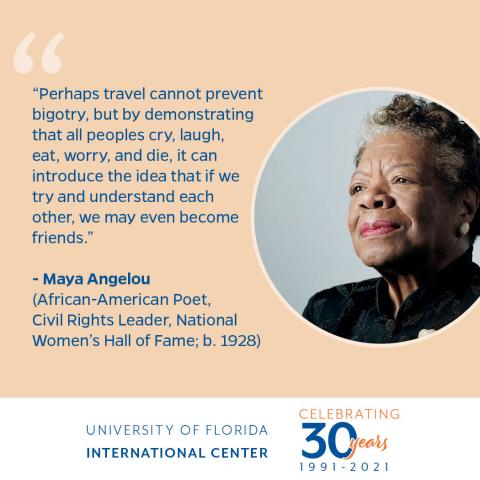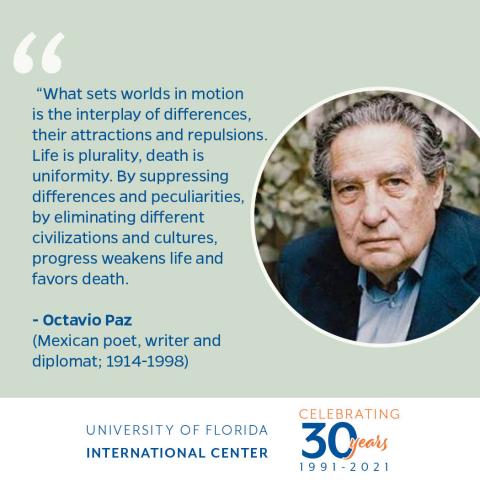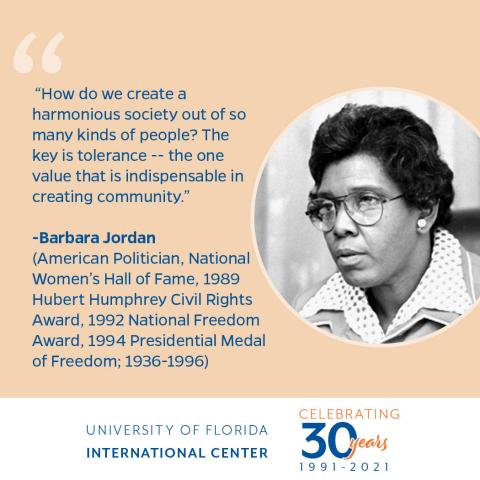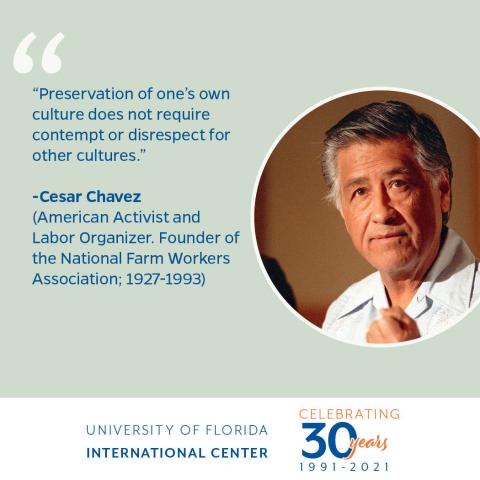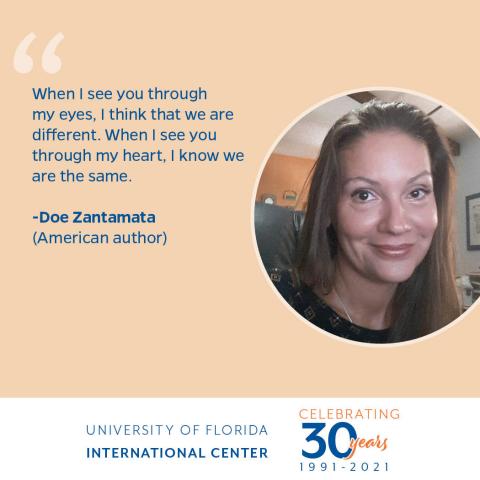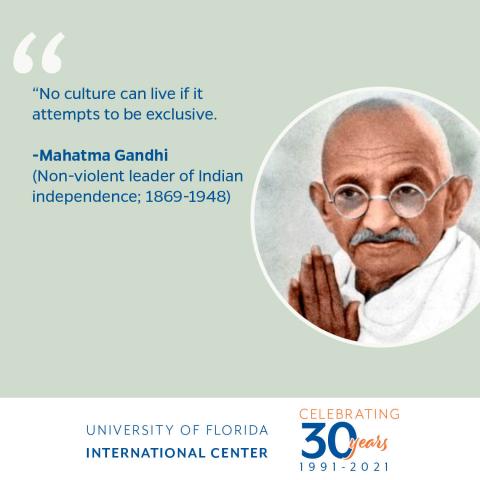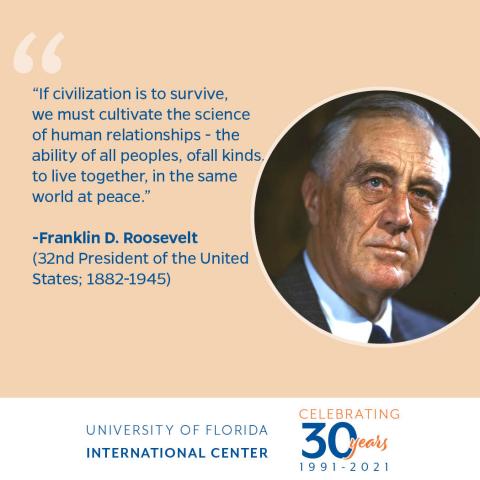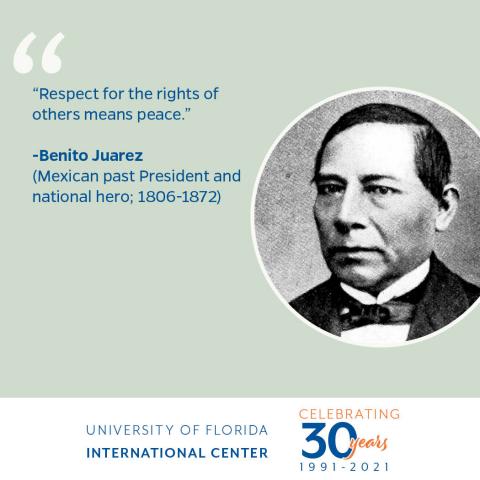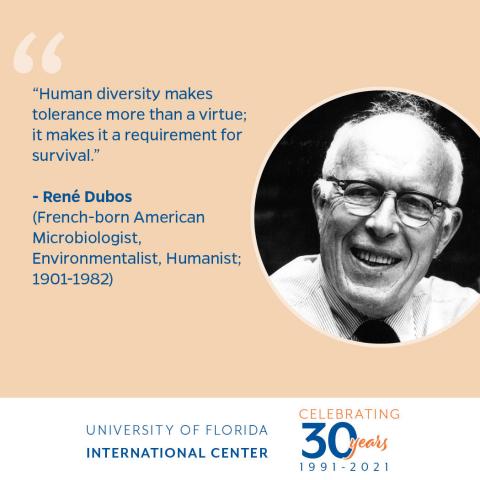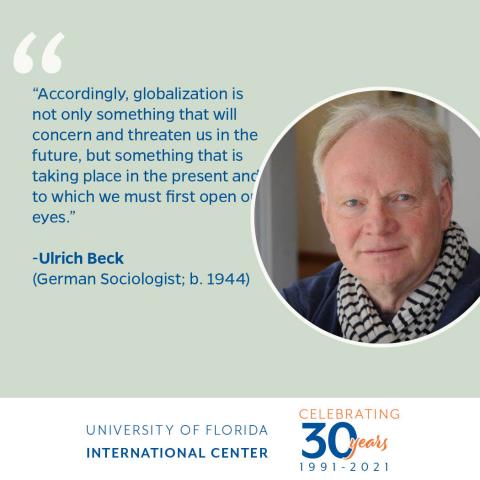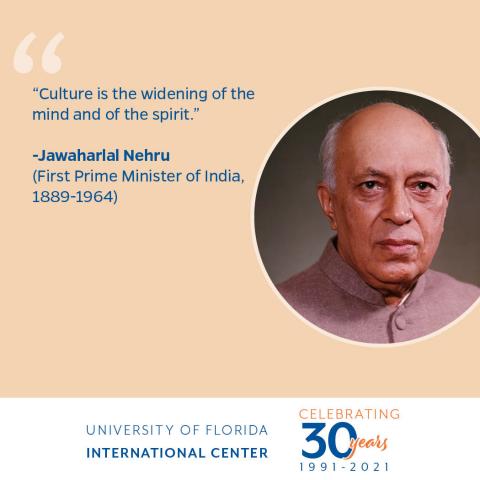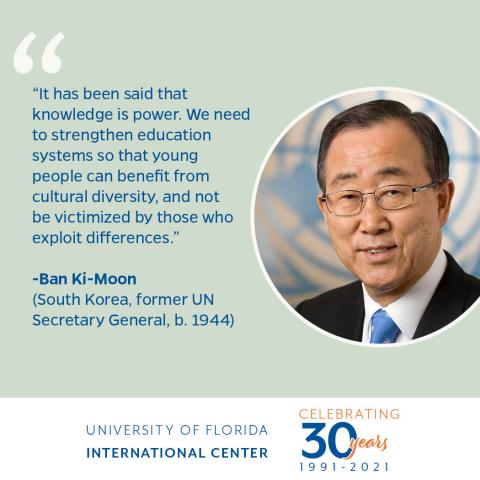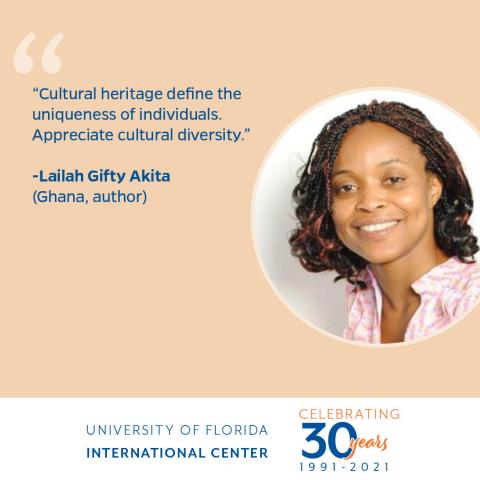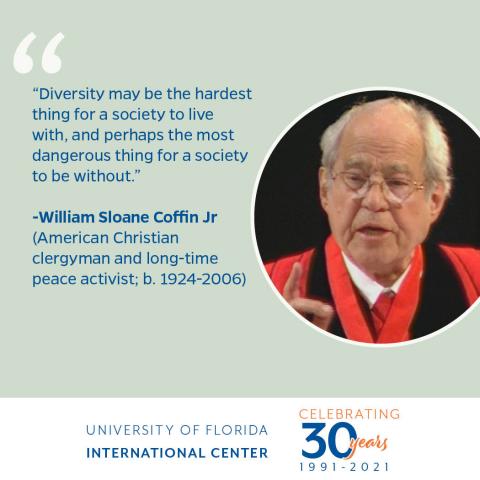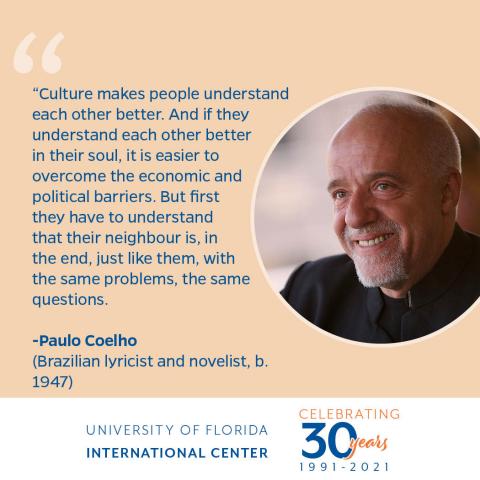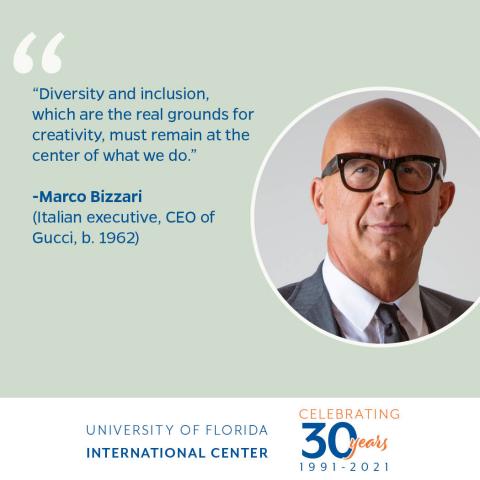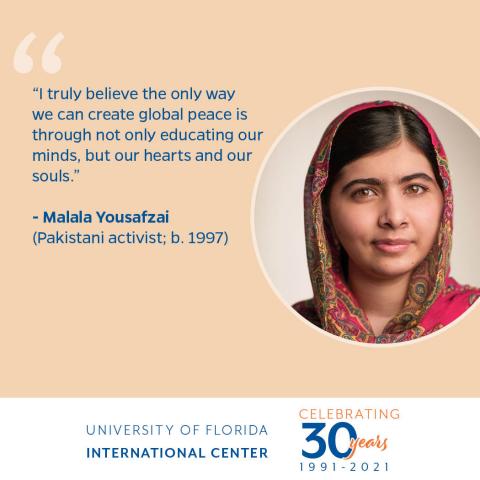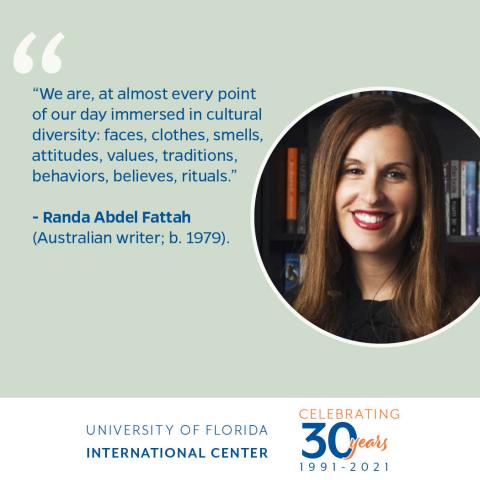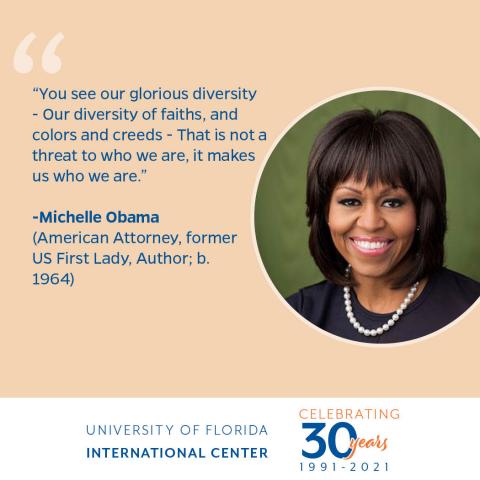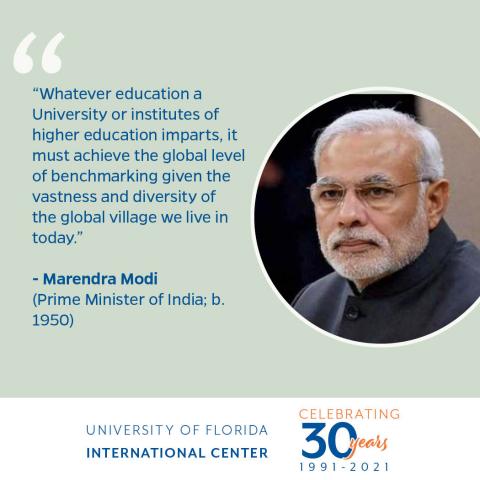Celebrating 30 Years of Supporting International Education on UF Campus
2021 marks 30 years of the UF International Center (UFIC) as a stand-alone unit on the Gainesville campus! Thirty years of building partnerships across borders, promoting international education on campus to position UF as a highly ranked global university, and contributing to make the world a better and more peaceful place.
We are celebrating this important anniversary with several events and activities throughout the year. Virtual and (hopefully) in-person events will take place on campus in the Fall to showcase UFIC’s positive impact on students, faculty, staff, departments, and colleges locally and around the world. These events will be organized around a central theme: “Celebrating 30 Years of Supporting International Education on UF Campus.”
A Global Mission
We have accomplished a great deal in the past three decades, and numerous responsibilities have been assigned to us since the Center was created in 1991. Many components of international education were being handled at several corners of the UF campus before our origin. The creation of one comprehensive unit meant that those responsibilities could be housed together in a single office lead by skilled and dedicated individuals. The establishment of the International Center created synergy amongst UF departments and fostered an environment in which international programs could flourish. New ideas and innovations in an international context were tested and a place was now available to our many constituencies to find support and encouragement for global engagement.
Over the years, we have organized our services and programs in new ways, and we will continue to do so as our role on campus continues to expand. We thrive to find additional ways to promote the mission of internationalization, both on and beyond campus, especially through challenging times like the one we are facing right now. A world-class university such as the University of Florida can be nothing less than fully committed to and engaged with the global community. UFIC’s very existence sends a clear message to the world that UF is, indeed, an international player concerning learning, and discovery… both of which are at the heart of a great university in this period of history.
In 1991, conversations and actions were initiated at the request of President John Lombardi (1990-1999) to centralize the various international activities spread across campus. Dr. Elizabeth Lowe together with Dr. Richard Downey was invited by Dr. Lombardi to set up the Office of International Studies and Programs (OISP). The University’s goal was to define its international mission and centralize international education services. Dr. Lowe started by establishing communications with the different departments and colleges that had international programs, and Dr. Downie focused on Study Abroad programs. Together they implemented procedures and practices to create the OISP, and in 1992 Dr. Uma Lele was the first-named director of the Center until 1993. Dr. Lele took on the task of organizing the beginnings of the International Center, spread around 16 centers. Around that time, Dr. Sandra Russo, current director of the Office for Global Research and Engagement started working voluntarily while working on other global research projects, and eventually joined the Center as part of the staff.
While Professor Lele’s position was only half-time, she quickly manifested her leadership by participating in two major projects. The first one was working with the Carter Center on a project helping newly democratized countries in economic development areas, and the program was managed by OISP under Lele’s administration. The other project was the Global Research on the Environmental and Agricultural Nexus (GREAN). This initiative was a collaboration with many universities and USAID. As OISP began to grow, it occupied part of the first and third floors of Tigert Hall, while the GREAN unit moved around the campus (Walker Hall, UFF, and others).
In 1993, R. Hunt Davis, Jr., Ph.D., professor of History and African Studies, joined the office at Dr. Lele’s request as the Associate Director. After her resignation, Dr. Hunt became the interim director for a year, followed by Dr. Paul Gibbs (then Professor of Virology at the UF College of Veterinary Medicine) who was named the director in 1994, together with Dr. Richard Downie who functioned as Assistant Director and Overseas Studies coordinator. Dr. Gibbs was involved in world peace process opportunities in the Middle East helping in Gaza and the West back to create a medical school, leading teams, and working on other projects with USAID. He was also instrumental in the $1.5 million awards from the Coca-Cola Foundation which initiatives enhanced global education opportunities for the university through the World Citizenship Program. This program provided UF students the opportunity to engage in internships abroad with CARE and UNICEF. Dr. Gibbs stepped down as Director in 1999. Provost Colburn served as Interim Director until a dean was chosen later that year. At that point, Lynn Frazier was named Executive Director. Ms. Margaretha Micha directed Incoming International Students, Dr. James Ellis directed Study Abroad, and Dr. Sandra Russo and Dr. Virginia Seitz pursued international research grants under the Program Development unit.
As the offers of international programs and services grew, Overseas Studies programs also expanded, the mark of the "Global Gator" was born, and students were able to earn credits abroad that counted toward their degree at UF.
Back then, international trips abroad were sometimes necessary to negotiate and hand-deliver signed documents and agreements. Alternately, overseas school representatives would visit our campus. There were about 300 study abroad participants per year and fees generated from this activity funded the study abroad unit operations within the Center. As study abroad programs grew, new staff were hired.
In 1997, most staff moved to Grinter Hall, and the name of the office changed to UF International Center in 1998. However, there was not enough space there for all Center staff, so the Office for Global Research Engagement unit (formerly Program Development) was located across the street in Peabody Hall.
Study abroad programs and participants continued to increase every year, with additional advisors added to support new programs and increasing numbers of students traveling abroad.
Dr. Dennis Jett served as dean from 2000-2007. During his tenure, UFIC and its entire staff moved to its current location in March of 2007, a renovated offices suite in The Hub. This spacious and more central location has enabled UFIC to position its entire array of resources into one building where students and faculty can easily find them. Its proximity to a common area where students relax, eat and study creates a comfortable environment for the Center's work to integrate with the rest of campus. During 2008-2009, Ms. Lynn Frazier served as interim dean and directed the search for a new dean.
Dr. David Sammons, former director of International Programs at UF’s Institute of Food and Agricultural Sciences, was named dean in 2009 and served until 2013. Under his administration, the Quality Enhancement Plan (QEP) for internationalization began to be developed. Dr. Susanne Hill had served as UFIC’s Executive Director since 2008, and by 2010, the Center administered programs that sent more than 1,500 students abroad, documented and tracked more than 4,500 international students, and provided administrative support for a sizable cohort of visiting scholars, non-U.S. born faculty, and J-1 visa holders. In addition, the Center garnered well over $2 million in program support funding from external sources.
In 2014, “internationalization” was the key component of UF’s Quality Enhancement Plan (QEP) for accreditation. The attention was now placed on the International Center, which named a new Dean, Dr. Leonardo Villalón (Professor of Political Science and African Studies).
Under the leadership of Provost Joseph Glover, Timothy S. Brophy (Director of Institutional Assessment), Cheryl Gater (Director of SACSCOC Accreditation), David Miller (Director of QEP Development), Leonardo Villalón (Director of QEP Implementation), and the UF Internationalization Task Force, a strategic, five-year plan was developed. The “Learning without Borders: Internationalizing the Gator Nation” (LWB) initiative was born.
LWB was designed to further internationalize the undergraduate learning experience at UF. It was a component of the university mission, and the plan directly addressed specific areas for improvement related to factors that impacted the participation of undergraduate students in international learning experiences.
The evolving needs of the QEP required several modifications. The growth of the programs created under the initiative required not only programmatic but also staffing adjustments. In 2019, the Office of Global Learning (OGL) was created as a culmination of advancing the goals of the QEP thanks to the support of Provost Joseph Glover. OGL oversees institutional initiatives such as curriculum internationalization, faculty and staff professional development, and assessment, as well as the administration of the International Scholars Program, Virtual Exchange Training, and the Peace Corps Prep Program.
In 2018, the University of Florida was selected as one of five institutions to receive the 2018 Senator Paul Simon Award for Comprehensive Internationalization awarded by NAFSA, the Association of International Educators. UF was recognized for its broad commitment to international education and research, grounded in its fundamental goals of preparing our students to meet the challenges of a globalized world, striving for faculty research excellence with a global impact, and advancing campus diversity.
In 2019, the Office of Global Learning was created as a culmination of advancing the goals of the QEP thanks to the support of Provost Joseph Glover. The Office of Global Learning oversees institutional initiatives such as curriculum internationalization, faculty and staff professional development, campus events, and assessment, as well as administering the International Scholars Program, and Peace Corp programs.
In 2020, at the beginning of a world pandemic, the International Student Services unit was divided into two separate units, each charged with one aspect of our dual mission of providing international students with guidance on complying with federal and other regulations, while also supporting them in their academic and other needs on campus.
UFIC also created a staff task force for Inclusion, Diversity, Equity, and Access (IDEA) in Summer 2020 with the goals of creating a more inclusive environment for staff, improving services for UFIC’s constituencies, and supporting UF’s mission to advance representation, inclusion, opportunity, and accountability as stated in The Decade Ahead plan.
Today, when the internationalization of American higher education is challenged like never, the imperative to redouble our efforts in pursuit of our core missions is clear. At universities, we are blessed to have unique resources, and a responsibility to use them to help make a better world.
New ideas, models, and frameworks for doing so—whether in health, social justice, environmental concerns, or other fields—are born and developed in our research labs and programs, in exchange and discussion with our international students and colleagues, and the perspectives that our study abroad students both share with their hosts and bring back to our community.
Now more than ever the UF International Center embraces its global mission as we plan a way forward in pursuit of international engagement in a post-pandemic world.
On behalf of all of the dedicated staff of the UF International Center, we look forward to continuing to work with the campus community in this crucial endeavor.
We want to thank all of our campus collaborators, faculty, students, and staff (past and current) who have helped us to make a world of difference during these past 30 years and for celebrating with us today.

